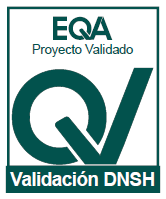Ence – Energía y Celulosa, as part of its commitment to the circular economy and the efficient use of resources, has launched a project aimed at researching and optimising the use of lignin to mix and bind, in a natural and sustainable way, materials used for road asphalting. This project has been certified by the European Quality Assurance (EQA), as it is fully aligned with the environmental objectives required by European legislation.
The “Bitúmina” project, launched in collaboration with the company Misturas, arose from the opportunity to design more environmentally friendly construction products, partly using products resulting from Ence’s cellulose process.
By including bio-based materials, such as lignin, which is naturally present in the wood that Ence uses as a raw material in its biofactories, it contributes to the promotion of a circular, low-carbon economy.
In this way, these materials will make it possible to replace some of the traditional bituminous materials on roads with natural materials, while at the same time reducing energy consumption and greenhouse gas emissions. In this way, this initiative can lead to environmental, technical and economic progress in road surfacing.
An essential requirement has been to obtain the DNSH declaration; a certificate that confirms that, with this research project, the company contributes to the mitigation and adaptation to climate change; to the sustainable use and protection of water and marine resources; to the transition towards a circular economy; to the prevention and control of pollution; and to the protection and recovery of biodiversity and ecosystems.
EQA (European Quality Assurance), an international certification body, states in its report that Ence is “fully committed to compliance with environmental legislation, and ensures that its suppliers/external collaborators comply with the requirements of the regulations with respect to the different activities” carried out in this project. This certificate is a mandatory requirement for R&D&I projects co-financed by the CDTI with Next Generation EU funds, which obliges companies to carry out an assessment of the impact on these environmental objectives when they carry out an investment or reform.
The initiative is supported by Cetim (Centro Tecnológico de Investigación Multisectorial) and the Universidade de Santiago de Compostela (Grupo Integrado de Ingeniería Civil y Geomática del Campus de Lugo), and will run for a period of three years.
With this project, Ence reinforces its contribution to the circular economy and its commitment to a sustainable future, respectful of the environment and people. A vision that the company applies to its different business lines: pulp, renewable energy and sustainable forest management; activities in whose diversification it is making progress as an active vector of decarbonisation.

